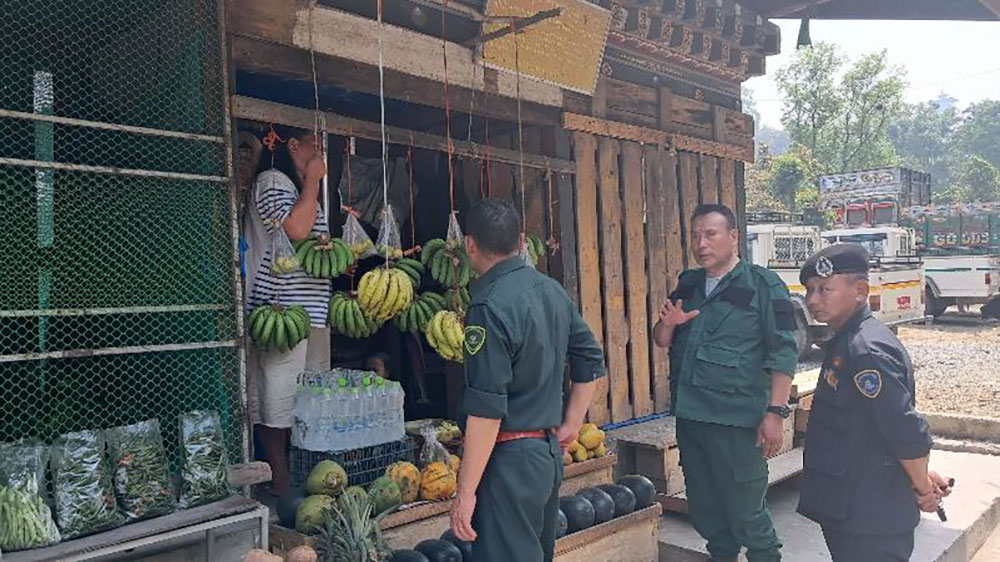At the cost of both humans and monkeys
Yangyel Lhaden
There is a growing concern about monkeys (Assamese Macaque) becoming dependent on humans for food, reducing their natural survival abilities. Monkeys have started waiting by the roadsides, raiding shops, clawing at vehicle doors for food when people are not feeding them.
Earlier this year, about 10 monkeys raided the Trongsa Dzong viewpoint cafeteria. They rummaged through the whole shop, drinking juice, eating chips, and toppling all the shop’s snacks.
Similar cases are also reported at Chuzom area, along the Thimphu-Phuentsholing highway, by monkeys raiding the shops.


Officials advocating commuters along the Thimphu -Phuentsholing highway on the impact of feeding wild animals
Feeding wild animals is an offence under section 187 of Forest and Nature Conservation Act of Bhutan (FNCAB) 2023 which states that any person feeding wild fauna, except in enclosure and for scientific research is an offence, liable to pay a fine of one month daily minimum national wage per incident.
An official from the Department of Forests and Park Services (DoFPS) said feeding monkeys or any wild animals leads to the animals becoming habituated to human food, disruption of their natural behaviour, and a reduction in their ability to find and utilise natural food sources. “Monkeys raiding a shop near the Trongsa viewpoint is an example of the consequences of humans feeding monkeys.”
“The monkeys there have become accustomed to human food because of travellers feeding them ritual leftovers at Trongsa Dzong,” the official said. “This behavior has led to increased human-monkey interactions, which resulted in conflicts.”
The official said that wild animals should never be fed human food. “When animals become accustomed to human food, it changes their natural habits and causes them to come closer to human settlements. They become bolder and more aggressive, leading to increased encounters and conflicts, which is dangerous for both humans and animals,” he said.
Signages dot our highways requesting not to feed wild animals. One of them along the Trongsa highway reads: “Please do not feed wild animals. Your generosity is harming their health and habits, and feeding wild animals is an offense under the Forests and Nature Conservation Act.”
However, it is common to see snacks, juices, and food (basically junk) being thrown out of vehicles whenever there are monkeys. Monkeys can easily tear open a packet of chips or insert a straw into a juice box and drink it. People watch this with awe.
A bus driver said that he fed monkeys because he believed it was a good deed and was not aware of the consequences.
The DoFPS official said that it was a misconception that monkeys were seeking food from humans because there was not enough food in the forest. “Monkeys like any other animals are opportunistic feeders and tend to exploit easy food sources. When they get accustomed to being fed by humans, they learn to associate humans with food.”
Studies on primate ecology show that even in disturbed habitats, monkeys can find sufficient food if left undisturbed by human activities and monkeys coming to human areas are primarily seeking easy food rather than suffering from a lack of food in their natural habitat.
“While habitat destruction is a concern, the solution is not to feed wild animals but to conserve and restore their natural habitats,” the DoFPS official said. “This approach supports the well-being of wildlife populations and maintains ecological balance.”
He also said that feeding wild animals also disrupted their health, as human food often lacked the necessary nutrients wild animals needed.
For example, bread, chips, and other processed foods, he said, could cause health problems in animals accustomed to a natural diet rich in specific vitamins, minerals, and proteins. Changes in dietary intake—such as human-fed food—may cause health problems such as obesity, dental issues, and metabolic disorders in wild animals.
“Feeding wild animals also causes predator-prey imbalances, as the influx of easy-to-obtain human food can alter predator-prey relationships,” the DoFPS official said. “Additionally, close contact with human food sources can facilitate the spread of diseases between humans and wildlife.”
To address the growing concern of feeding wild animals, the DoFPS is conducting a series of awareness programmes on the consequences of feeding wild animals.
“After the awareness programmes, the DoFPS will start strict implementation of the relevant clause on the feeding of wildlife based on the FNCAB 2023,” the DoFPS official said.


